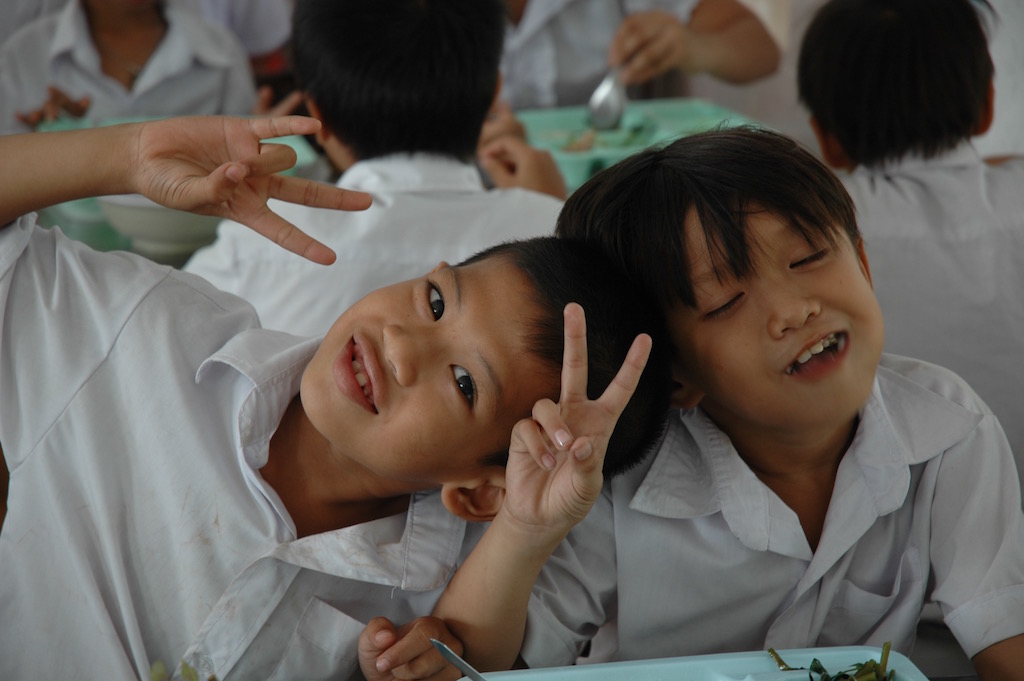 Le Thi My Huong has a searing memory of leaving Vietnam when she was five. “I remember a white car and looking out the back window and watching my mother cry hysterically as we drove away.”
Le Thi My Huong has a searing memory of leaving Vietnam when she was five. “I remember a white car and looking out the back window and watching my mother cry hysterically as we drove away.”
It was April, 1975, the end of the American-Vietnam War, and southern Vietnamese mothers, fearing rumors that their babies and children–especially those born of foreign soldiers, like My Huong and her younger brother–would be killed by Viet Cong, painfully gave them up during Operation Babylift. These children were evacuated mostly to the U.S., but also to Australia, Canada, and Europe to be adopted.
My Huong and her younger brother were adopted by an Australian family who also had two older sons. Growing up in Australia, My Huong was not allowed to speak of Vietnam. She had been told her parents were dead, even though her memory carried a different truth.
Finding Her Calling in Africa
It would be 30 years before she returned to Vietnam and found her birth mother. In the intervening time, she would go to Africa, first as a child with her adoptive family while her father worked in Tanzania for a year, and later in 1999 to Zambia to fulfill a promise to herself to return to Africa to aid the poor. At the time, she had little money and no real plan, just a larger than life desire to help others in need.
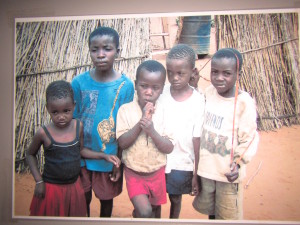
In the end, My Huong’s work in Zambia attracted the attention of a church and with their support, My Huong succeeded in feeding 500 orphaned children per week who were living on the streets. She also fulfilled a goal of getting 16 boys whose parents had all died of AIDS off the street and into a home.
Sadly, after three years, it was time for My Huong to pass her work on to the church and leave. “The corruption got to be too great,” she says.
She left with confidence, though. “If you can make something work in Africa, you can make it work anywhere!”
Meeting Le Thi My Huong
I had first heard about Le Thi My Huong from Australian expats in Vung Tau, Vietnam, a beach town two hours south of Ho Chi Minh City, where we stayed for two weeks as part of our world travel adventures. These expats told me that My Huong had been adopted out of Vietnam when she was five and returned thirty years later to find her birth mother. They told me about the amazing work she was doing at the Vung Tau orphanage, where she also cared for disabled kids who had been affected by Agent Orange, a nasty, irresponsible product of the war, and about the learning center in nearby Long Hai that she helped to create for the very poor with the French Association Pour les Enfants des Rizières (APER), a heart-felt charity organization based near Paris, France.
She sounded remarkable. I had to meet her!
After a brief phone call, My Huong agreed to pick our family up from our apartment to give us a tour of the Vung Tau orphanage (officially, the Centre for Social Protection of Children Vung Tau) and the Long Hai learning center (officially, the Centre for Social Protection of Children Long Hai).
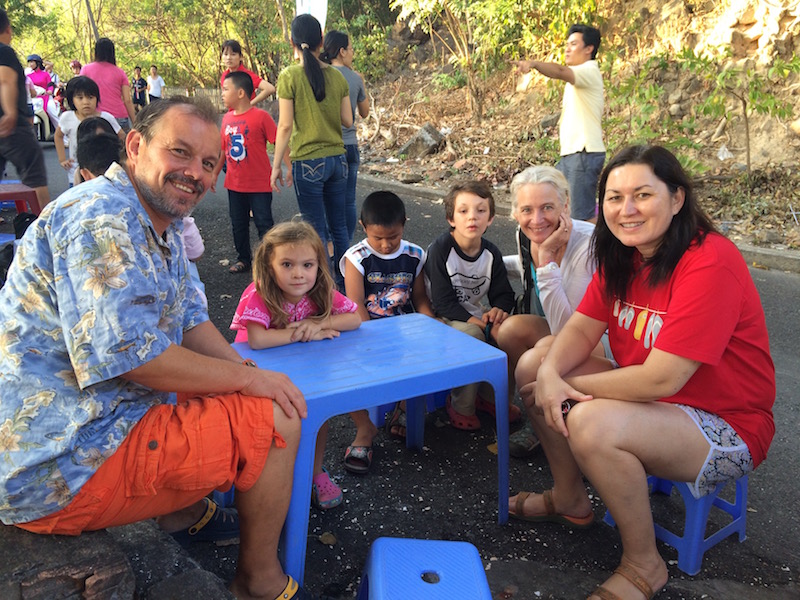
She brought along Truyen, her cousin and personal assistant, and her adopted five-year-old son, Sam, who was out of school on holiday, as it was New Year’s Eve day. Her 13-year-old son Daniel, also adopted, stayed home to work on a computer he was building from parts via YouTube videos.
Having watched three English-speaking television programs that featured My Huong’s story, I felt comfortable greeting her with a hug. Although her skin is white and her voice and language is that of a lively, educated Australian, the shape of her hazel eyes distinguishes her as Asian. After living in Vietnam for over 10 years now, she can also speak Vietnamese, which she admits she’s still learning.
All of us pile into her SUV, a fund-raising donation from a local restaurant after the government moved the Vung Tau orphanage from just down the street to a building 7 km. away.
Otherwise, she and her cousins, like the rest of the Vietnamese, get around on motorbikes, which is insane! Thousands weave through packed streets, carrying all manner of items, from babies to bookshelves.
“Isn’t it scary riding a motorbike here?” I ask her in genuine concern.
“Well, when you have to do something, you just do it, don’t you?” she responds.
It occurs to me that this could stand for her life philosophy. When she feels something needs to get done, she just jumps in and does it, without question, whether that’s deciding to find her biological mother, or live in Vietnam, or help those in need.
Finding Her Biological Mother
After Africa, My Huong returned to Australia and began work as co-ordinator of a counseling program at Drug ARM, a clinic for drug and alcohol rehabilitation.
During this period, My Huong’s thoughts returned to her biological mother. In 1985, her adoptive mother died. While going through her files, My Huong discovered an address for a village in Vietnam and knew at once this must be her biological mother’s home.
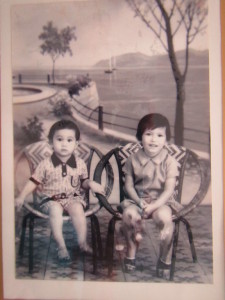
In March, 2004, after a letter-writing campaign failed, My Huong decided to fly to the address, located in the village of Can Tho in the Mekong Delta in southern Vietnam. She was by then 35 years old.
“My best friend from childhood was sitting in front of the house we used to play at, and she recognized me!” My Huong recalls. “She sent someone to get my mother.” A deeply emotional reunion between mother and daughter ensued. (The reunion was captured on this video provided by My Huong and copyrighted by Tania Caldwell.)
My Huong decided in that moment to move back to Vietnam and reclaim the family she had lost so many years ago. She had the opportunity to reacquaint herself with her mother, a sister born after her, the aunt who used to watch her while her mother worked, and so many cousins and second cousins.
I ask her now if it was difficult to assimilate to Vietnamese society and culture, where family is so integrated into daily life, where children take care of aging parents no matter what, where siblings and cousins live together and look out for each other.
“No,” she says. “It was hard for me to assimilate back to Australia after being in Africa. I was in line at the grocery store and two women in front were arguing that there weren’t enough varieties of cereal in the store. I nearly lost it then!”
Adopting Her Son Leads to Her Work at the Orphanage
After moving to Vietnam permanently, My Huong lived at first with her mother and extended family in Can Tho while working for a language school there, teaching English. After that school closed, she moved to Vung Tau, a city where her mother had also once lived, to work at a different language school.
In late 2007, My Huong approached the Vung Tau orphanage about adopting a three-year-old boy. When she and her mother met with the orphanage, the director at the time, Le Thi Trang Dai, asked her if she would accept a five-year-old. Without pause, she said, yes.
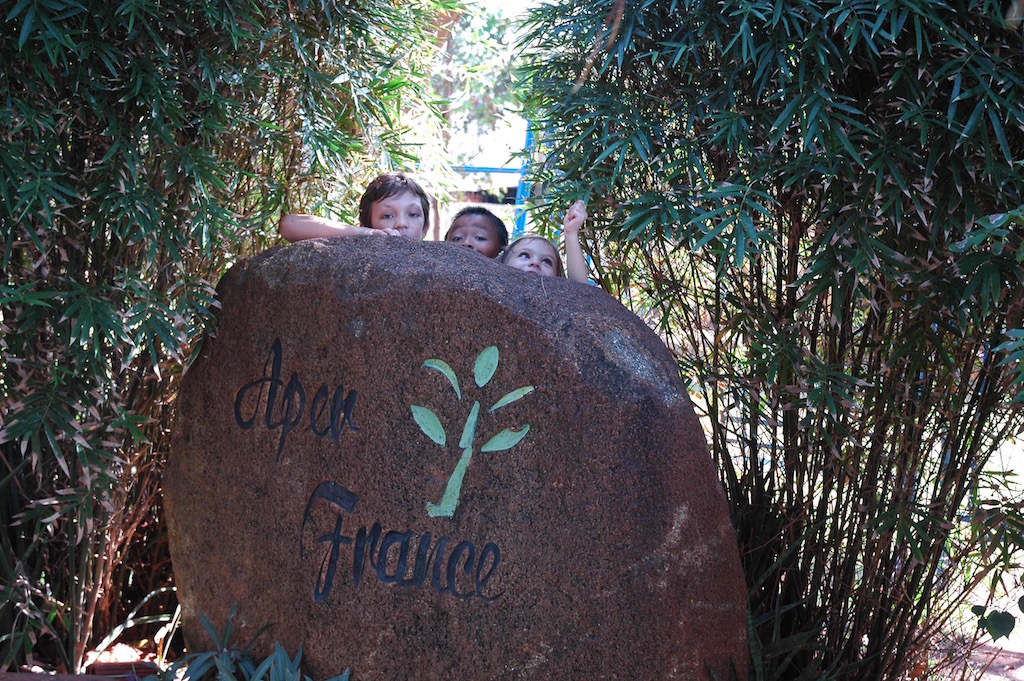
“I was adopted at age five, so I thought, yes, of course, I was meant to adopt a five-year-old,” My Huong recalls. “The director left and came back with a small, underweight boy, placed him on my lap, and told me, ‘This is your son.’ I had just met him for the first time, and suddenly, I’m a mother!”
In truth, the adoption for Daniel, who is today 13 and towers over his mother, took another nine months to finalize. During this time, the director called My Huong and, knowing about the work she did in Africa, asked her to join the orphanage as a representative of APER, the French charity organization, whose former representative had to return to France.
Without hesitation, My Huong obliged, eventually becoming the center’s vice-director. She also worked with the APER to build a second center in Long Hai, which is primarily a school for “the poorest of the poor,” My Huong says.
Touring the Orphanage and Learning Center
When we arrive at the Vung Tau orphanage, a clean, white, expansive building set upon some grounds behind a gate, about 10 children from ages 7 to 15 come running to greet us. My son Julien starts handing out the lollipops Santa gave him, and gives his radio-controlled car, a recent birthday gift, to one of the boys. The boys immediately gather to play with it. Curious about us, one girl stays behind. My Huong lets us know she’s deaf.
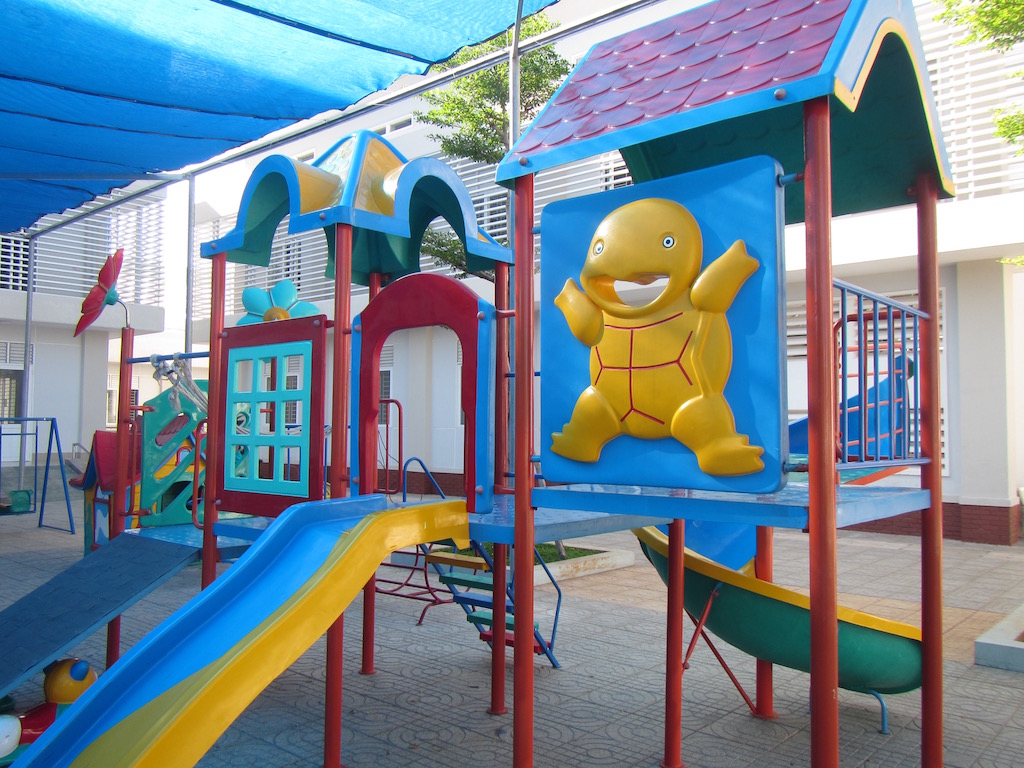
My Huong points to the large cover that gives shade to the playground. “We got this great playground, but the kids wouldn’t use it because it’s too hot. So, a group of Australian expats raised the $US 4,000 to get us that huge shade cover, and now the kids play there!”
My Huong explains that these types of gifts in kind have helped her make this orphanage what she assures me is the best in Asia. Right now, My Huong is raising money to get the kids mattresses for their beds (“the good kind, not the cheap ones we’ll have to replace in six months”), but in the meantime, the kids don’t seem to mind sleeping on the floor, and the entire building is immaculately clean and well-organized. There is even a row of computers, donated by Orphan Impact.
My Huong works tirelessly to raise funds and ensure “her” kids are comfortable, happy, and have positive outlooks on their future. “There is always more to do,” she says.
We leave our kids at the playground with Sam, My Huong’s son, and begin our tour.
A Photo Tour of the Vung Tau Orphanage
There are currently 88 children at this center. We start with the babies.
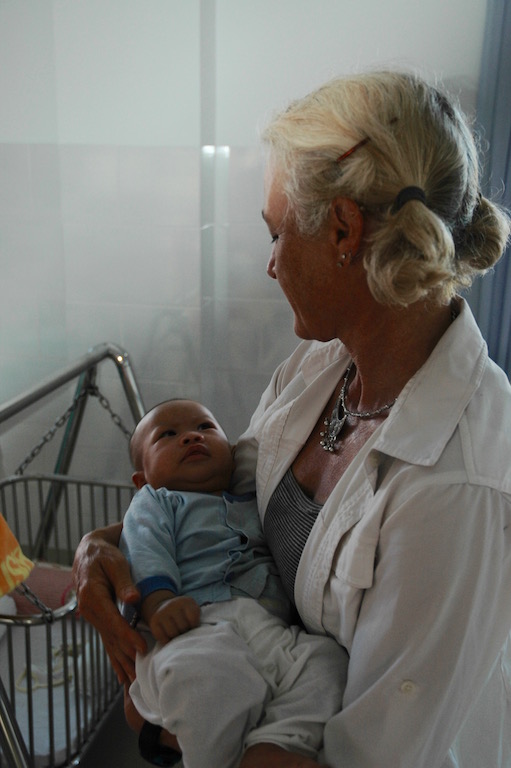 Here I am with the smallest of about five abandoned infants at the Vung Tau orphanage. My Huong explains that they used to have many more babies, but international laws (Hague Adoption Convention laws) have made it much more difficult to adopt, and so the center has been forced to turn down babies unless they are 100% abandoned. This means birth mothers can no longer come and give the center their babies. It’s complicated!
Here I am with the smallest of about five abandoned infants at the Vung Tau orphanage. My Huong explains that they used to have many more babies, but international laws (Hague Adoption Convention laws) have made it much more difficult to adopt, and so the center has been forced to turn down babies unless they are 100% abandoned. This means birth mothers can no longer come and give the center their babies. It’s complicated!
“In 2009 we had 110 adoptions. This year, none, because of those international laws,” My Huong says. “Kids have to be adopted from within their country first, and the Vietnamese don’t believe in adoption unless it’s within the family.”
Note: Here is where the U.S. currently stands on adoption from Vietnam.
My Huong tells the story of a mother who delivered her baby and threw it in the trash. The grandfather pulled the baby out and brought it to her center. “Very sadly, we could not take the baby, because the grandfather is family, so the baby was not considered 100% abandoned.”
My Huong tells me another story of how some kids end up at her orphanage. “In Vietnam, the first born son and his family live with his parents in their home. The son has to care for his parents, but when the parents pass, he gets the house. Well, in this one family, the first born son was murdered and the second born son kicked his brother’s wife and children out of their parents’ house. This poor woman had just lost her husband and now she had lost her home too. She lived on the street and tried to make ends meet but couldn’t and was forced to bring her three children to our orphanage. They’re here with us now. I just couldn’t say no to her.”
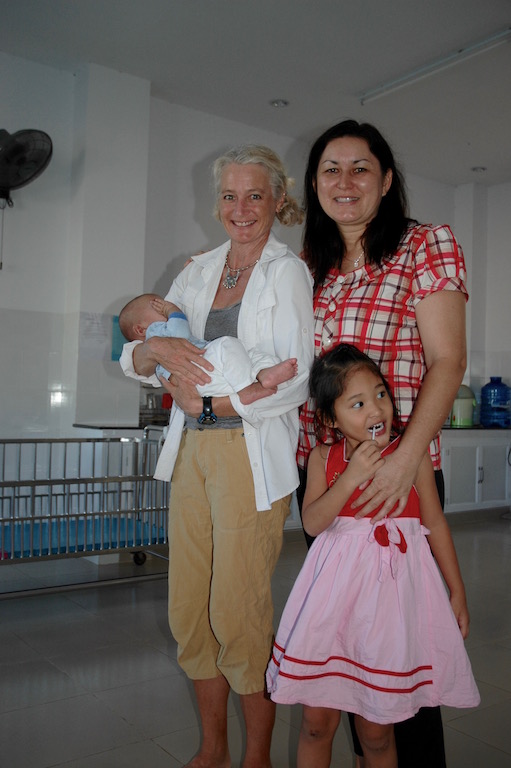 I’m posing with one of the infants and My Huong Le, along with the little girl who is deaf. A few of the kids at this center are HIV positive or have other disabilities, which can make it difficult for them to get adopted. “We also never separate siblings,” My Huong says. The managing staff at the center is always putting the kids first. They once stopped an adoption that didn’t feel right to them, “which is very expensive to do,” My Huong says. “But a child’s safety and happiness come first.”
I’m posing with one of the infants and My Huong Le, along with the little girl who is deaf. A few of the kids at this center are HIV positive or have other disabilities, which can make it difficult for them to get adopted. “We also never separate siblings,” My Huong says. The managing staff at the center is always putting the kids first. They once stopped an adoption that didn’t feel right to them, “which is very expensive to do,” My Huong says. “But a child’s safety and happiness come first.”
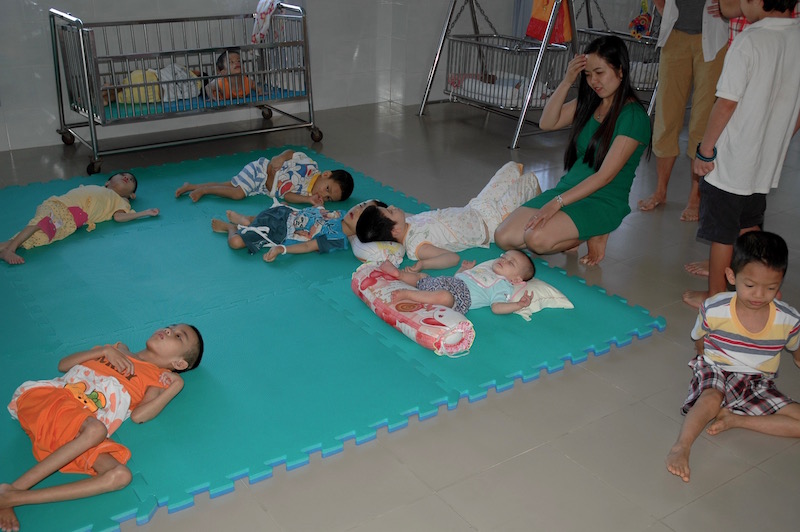 This is the room for the children suffering from cerebral palsy. The child all the way to the right, off the mat is also blind, but if you pick him up and hold him very close, My Huong says he can sort of see you, and he gets very excited and happy, smiling and suddenly jerking his body, just being in your arms. In another room, there are two nurses who provide kids with special needs daily physical therapy.
This is the room for the children suffering from cerebral palsy. The child all the way to the right, off the mat is also blind, but if you pick him up and hold him very close, My Huong says he can sort of see you, and he gets very excited and happy, smiling and suddenly jerking his body, just being in your arms. In another room, there are two nurses who provide kids with special needs daily physical therapy.
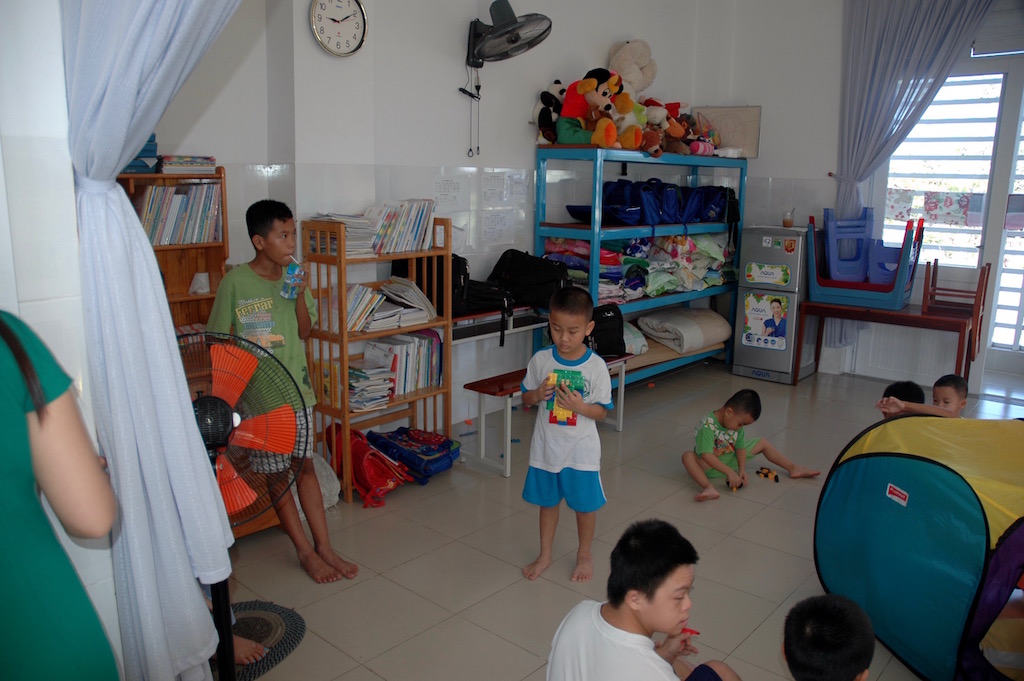
My Huong says, “As much as we can, we take these kids out to the movies or for dinner at KFC. They go to the schools around here and they hear about other kids doing those things with their families. Well, we [My Huong and her staff] are their family, and we try to do those things for them.” She sighs, “Still, all they want is a family of their own. They’re always asking why won’t someone adopt them.”
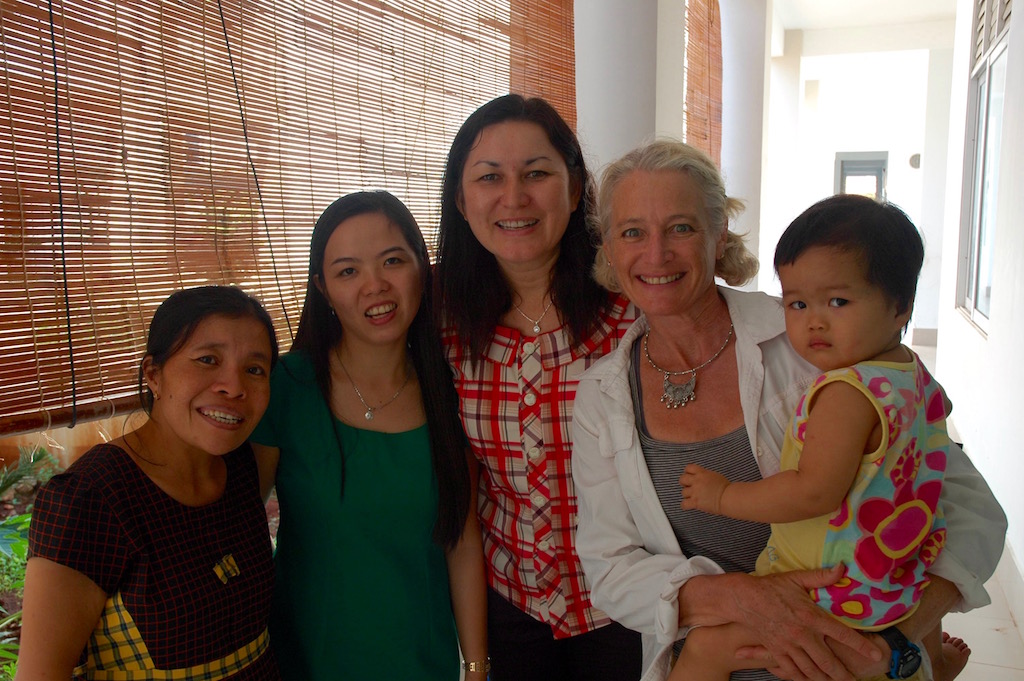 Here is the group that runs the Vung Tau orphanage posing with me, including My Huong Le (APER representative at this center) in the middle, her cousin and personal assistant standing next to her in green (Truyan), and the current Director, Chu Thi Thu, all the way to the left. I’m holding a cute little orphan girl.
Here is the group that runs the Vung Tau orphanage posing with me, including My Huong Le (APER representative at this center) in the middle, her cousin and personal assistant standing next to her in green (Truyan), and the current Director, Chu Thi Thu, all the way to the left. I’m holding a cute little orphan girl.
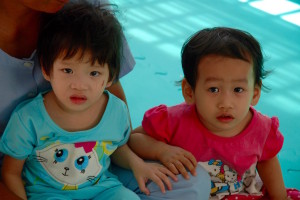
I ask My Huong what the best and worst things are about running the orphanage. She says, “The best is seeing the kids happy and when the kids get adopted. That’s my number one wish, that every child gets adopted. The worst? Constantly being inundated with needs.”
A Photo Tour of the Long Hai Learning Center
After our emotional visit to the orphanage, we pile back into the car and drive the 20 or so km. to the Long Hai learning center, which was created in 2007 and works to educate the very poor. It is another gated building set upon grassy grounds with a play area. Its walls are painted with enchanting scenes, and like any other school, the kids wear uniforms and the teachers wear traditional Vietnamese outfits (called ao dai) in a matching bright, floral pattern.
There are 149 students here, 20 of whom are mentally disabled.
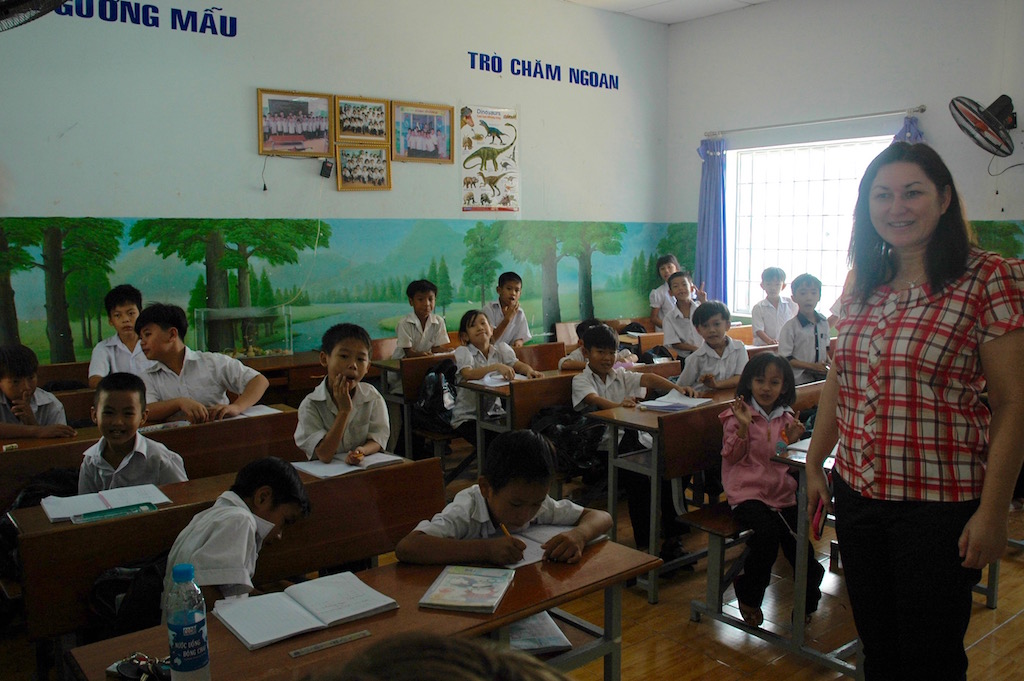 My Huong Le (the Vice-Director of Long Hai center for learning) stands at the front of a first grade classroom. My Huong offers children who would otherwise be working on the streets a free, structured education.
My Huong Le (the Vice-Director of Long Hai center for learning) stands at the front of a first grade classroom. My Huong offers children who would otherwise be working on the streets a free, structured education.
All their uniforms are made by the older students in their sewing program. For older, illiterate students, the learning center offers skills training in sewing, motorbike repair, and hair/salon services.
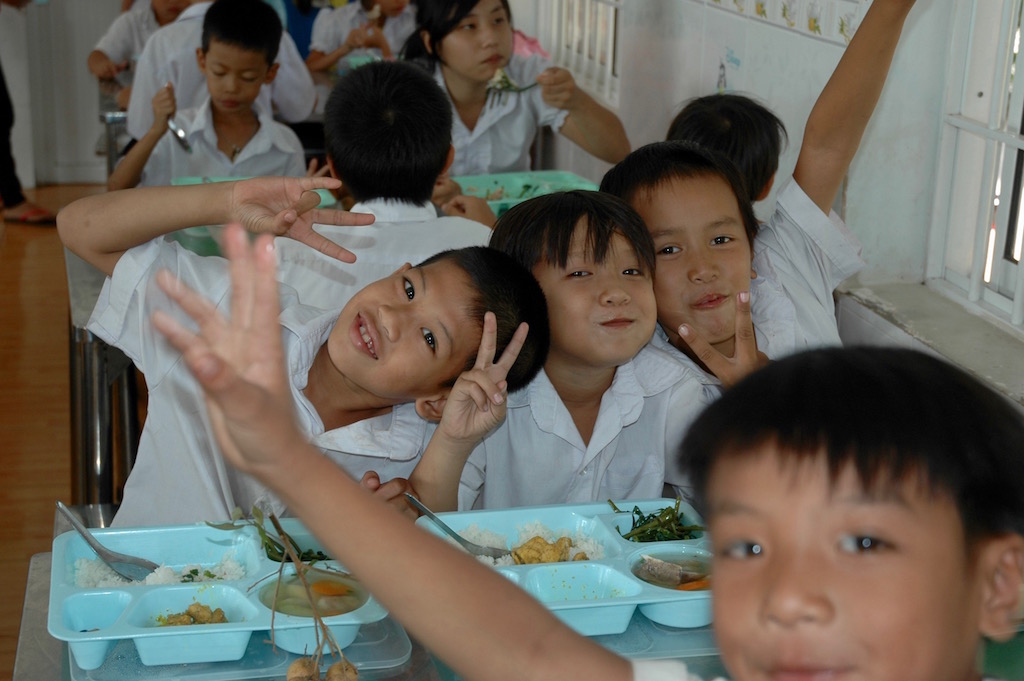
Kids goofing off at lunch. My Huong ensures kids get at least one good meal a day, so she feeds them. She also has them take a nap and bathe at the learning center before they leave. Once they go home, many have to work to bring in whatever money they can for their families.
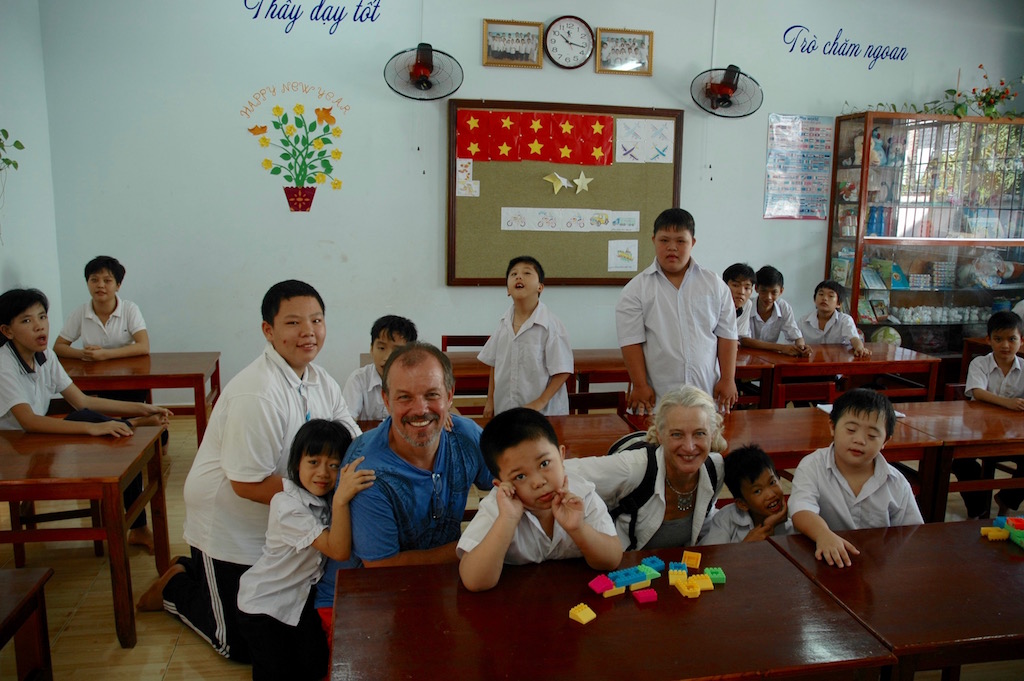 This is the classroom for those with mental disabilities. These kids are really great! The one between Pierre and me insisted we take his picture. He was adorable!
This is the classroom for those with mental disabilities. These kids are really great! The one between Pierre and me insisted we take his picture. He was adorable!
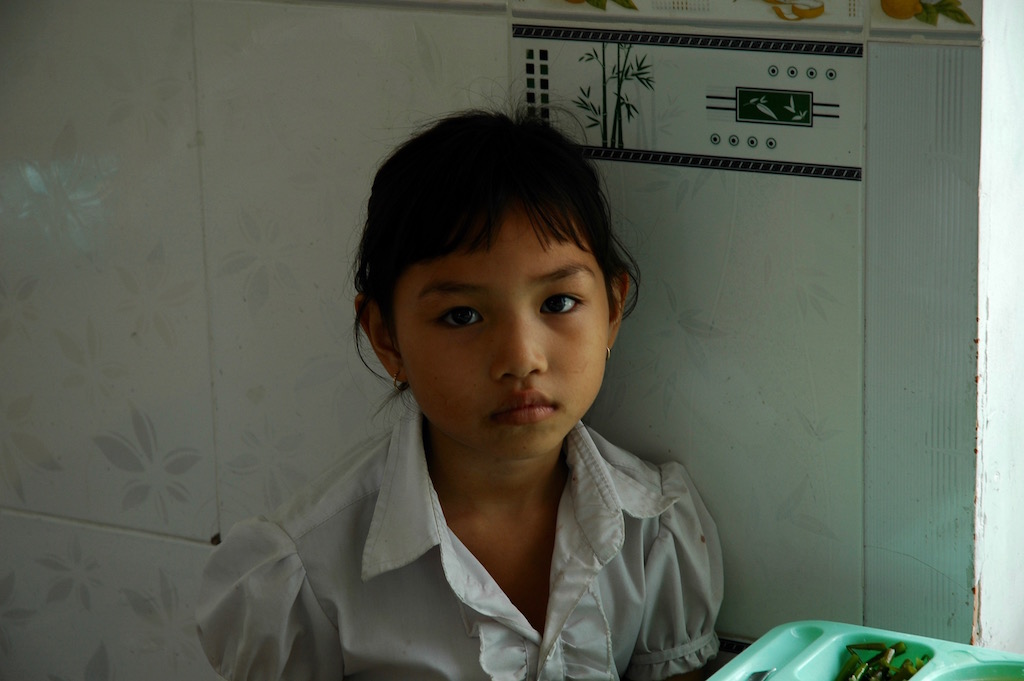 A beautiful girl in a solemn mood. Earlier in the classroom, she was smiling at us with curiosity.
A beautiful girl in a solemn mood. Earlier in the classroom, she was smiling at us with curiosity.
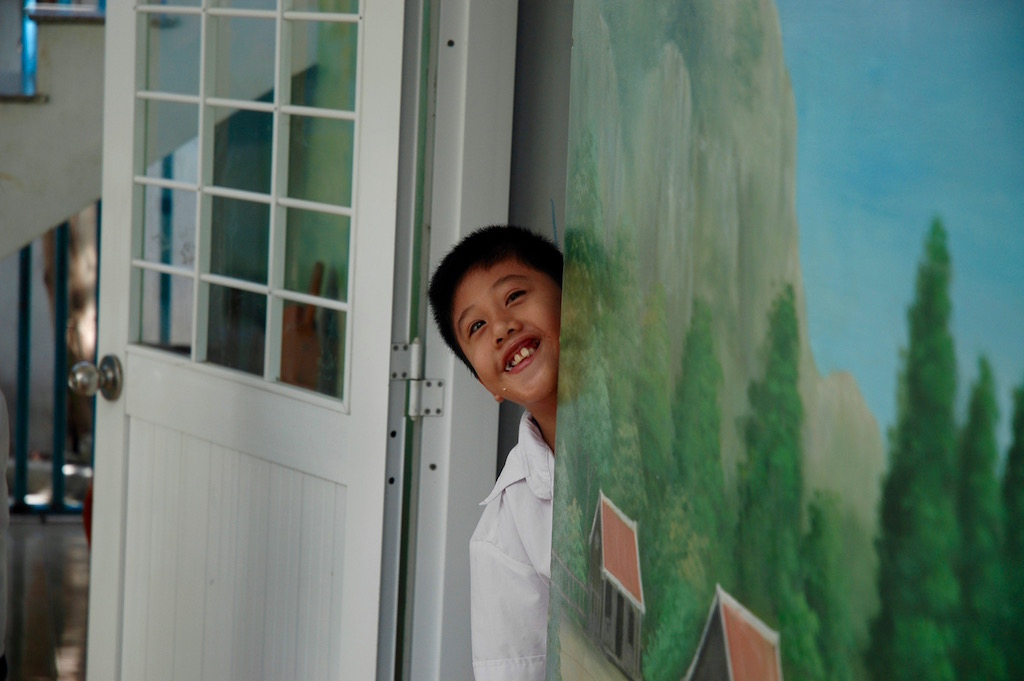 A boy poking his nose out of his classroom at the Long Hai learning center. All the walls are elaborately painted, inspiring a fairy tale.
A boy poking his nose out of his classroom at the Long Hai learning center. All the walls are elaborately painted, inspiring a fairy tale.
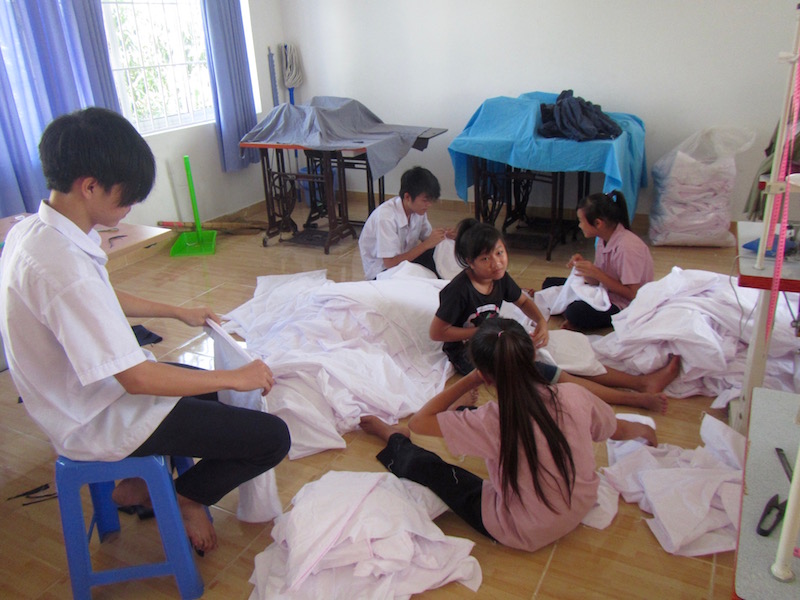 Sewing is one of the three skills training the center offers older students who are illiterate (along with motorbike repair and hair/salon services). At the moment, they are making curtains for a local hotel.
Sewing is one of the three skills training the center offers older students who are illiterate (along with motorbike repair and hair/salon services). At the moment, they are making curtains for a local hotel.
Helping Others
As you might imagine, My Huong’s caring doesn’t stop with her work at the centers. As we wait for some paperwork to be completed, she tells us the story of a woman who came to her door selling lottery tickets. “She was disabled from polio and riding one of those wheelchairs you have to pump with your arms to get it to move, and she had terrible pain in her arms.
“I asked her where she lived, and to take me there. So my sons and I went to have a look. She was living in this one room and had nothing, really. I told her right then I was going to buy her an electric wheelchair.”
So, My Huong got on the phone and raised the $1,200 to buy her an electric chair. She also got her a TV. Her sons pitched in by picking things out of their own house, a pillow here, a blanket there, to give to her. “She looks ten years younger,” My Huong reports, “And she doesn’t have pain in her arms anymore!”
Helping Other Adoptees
My Huong also helps other Vietnamese adoptees find their birth mothers, but warns them: “If you find your birth mother you have to be prepared to take care of her; it’s cultural, it’s in their blood. Otherwise, don’t go looking for her in the first place.”
My Huong tells me the story of a boy whose father murdered his mother and put him at the orphanage. “I guarantee that boy will end up taking care of his father. That’s what they’ve been doing here for countless generations, taking care of their parents no matter what.”
The Future for My Huong
We end up at My Huong’s house the next day so Sam and our kids could play. Her son Daniel is in one of the rooms, playing Mind Craft on the computer he built, along with two friends. My Huong tells me that Daniel said to her, “No one believed I could build this computer myself, no one. Except you.”
“I told him, ‘Of course I believed you could do it. I believe you can do anything you set your mind to.’”
After spending three days with My Huong and her kids and hearing her many, inspiring stories, the main thing I’ve learned about her is that she follows her gut, keeps her word, and takes immediate action on her decisions, trusting God and the universe to support her. And she is 110% committed to her causes, which mostly involve the loving care of orphaned children.
I ask My Huong what she sees in her future. This is the list she gives me:
“It will take a couple of years to get the new Vung Tau center where I want it to be. It needs a football field and a sports area. I also want to paint it, and do much more.
“I would also like to see the Long Hai learning center become residential.
“Then, I’d really like to build a row of 15 houses, just rooms, really, to give poor mothers a place to go with their babies rent free, so that they don’t have to abandon their children to survive. It’ll cost $ US 2,000 for the land, and then we just build!”
Finally, long-term, My Huong has a business idea. She wants to create an Alcohol and Drug Addiction rehabilitation center here in Vung Tau, making it available to Australians. “Except I want to extend the time period: three months of rehab followed by three months of community service. They can work at the centers, helping out,” she explains.
She laughs. “I don’t know where I’m going to get the money for that. But somehow, it will happen.”
Looking at the work she’s accomplished and the results she’s created seemingly “out of thin air,” I have no doubt she will find a way to make all these dreams a reality one day.
To Learn More, and Donate…
To learn more about My Huong’s story of finding her birth mother, please see the following T.V. programs:
ABC Foreign Correspondent “Are you my mother”
Talk Vietnam
Net Viet
Also, please donate to My Huong’s orphanage! A little money goes a long way in Vietnam. Any amount will help My Huong continue doing the amazing work she does. Her needs are constantly changing, but here is an example of what she is currently trying to fund (at the time of this write-up):
- Food items are always needed – rice, oil, fish sauce, noodles, milk, etc.
- Clothes and shoes for all children
- Sports equipment – 1 table tennis table, soccer balls, basketballs, badminton equipment
- Bicycles for children to get to school
- Material for the sewing training to make general clothing items
- 7 computers for computer training and 7 computer desks
TO DONATE, please contact My Huong through the email provided on their web page here.
If you have any questions, please email me! If you know a company who might be interested in helping, I will put them directly in touch with My Huong. Thank you, thank you!
My Huong is truly an amazing woman, making a difference in this world.
Hi Cindy and Pierre! (and kids!). Your travels look AMAZING! This article, however, is of particular interest (my husband Tony found it) because I have been a friend of My Huong’s for over 6 years now. My girlfriend Donna and I took a trip to Vietnam (from Australia) to view the Centres so I could begin to take sporting tours to Vietnam with the intent of fundraising for and travelling with a cause. We fell in love with the children and now Donna takes Mother and Daughter groups to Vietnam and the Centres, fundraising and giving the children painting lessons, which they LOVE! She calls her organisation Heart to Heart. I take smaller groups over there but we fundraise BIG! I call my organisation WATCH (What about the Children). We both have struck strong bonds with My Huong, maybe it is our Australian connection, but I know My Huong could make strong friends with anyone! I am so glad she is reaching many people from all over the world who ‘get it’, who understand her intent and her passion for these children and her ambition for each every child that comes under her care. If, on your travels, you ever get to Australia you should drop us a line as both Tony and I would love to meet up with you and your family. We live in Newcastle, NSW and live on the shores of beautiful Lake Macquarie. I wish you safe travels and once again thank you for a great article on My Huong.
Hi, Trude –
Thank you, and so great to hear from you! I remember My Huong mentioning an organization called Heart to Heart, and saying that I should talk to Donna about it sometime. Your organization sounds wonderful too. I love hearing inspiring stories about people making a difference in the world. It’s one of my favorite topics to write about. And My Huong is really a special, remarkable human being. She is so generous with her time and spirit as well. I do feel like she is a good friend now. When you have a moment, can you send me an email (on the Contact page), so we can connect? All the best to you, your husband, and Donna!
My wife and I were just in Vung Tau and met My Huong (Ann) . What a moving and inspirational lady.
We also got introduced to her through some expats. We have decided to sponsor a couple of the children who have no hope of being adopted. A little money goes a very long way so please help her if possible.
Hi, Scott –
Thanks for writing! Yes, My Huong is truly amazing; she is all about what more she can do to help others. What a wonderful thing for you and your wife to do, to sponsor some of the children in her care. Money does go a long way in Vietnam. I hope you had a wonderful visit to this special place. All the best, Cindy
I would like to come and see…
Hi, Michael –
You can contact the Vung Tau Center for Social Protection of Children, I believe at this number (if it’s still good) +84 254 3560 522 to arrange for a visit. Please note, however, that visitors are only accommodated if they are interested in adoption or plan to volunteer in some capacity. Otherwise, visitors can’t just come and look. All the best to you.
Cindy
I would like to give a helping hand by doing volunteer work and small donation to the orphanage whenever i visit vung tau. I like vung tau very much so i feel that i should do something for it.
thank you
have a nice day
Kent –
That is wonderful. I will let My Huong Le know.
Take care, Cindy